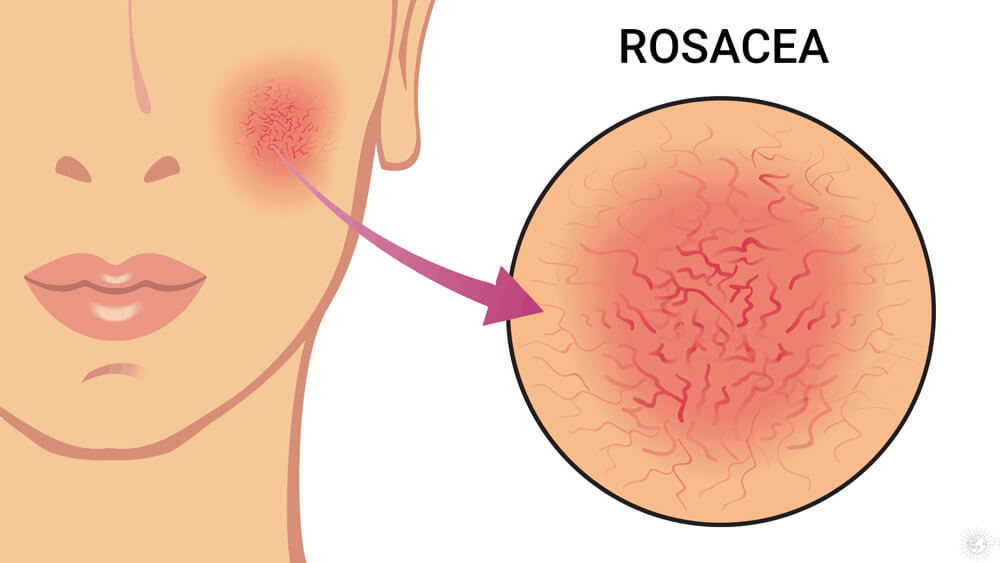Dealing with a red face is, well, not exactly comfortable. Thankfully, most of us left the pizza face jokes in the high school hallway. But not everyone…
Rosacea—the stubborn rashy redness found across the nose, cheeks, forehead or chin—is a skin condition that follows some people into adulthood. It can look like an innocent sunburn at first, or even a light blush. Depending on the person, the skin on and around the nose can swell (this is called rhinophyma). In these cases, the redness is a sign of swollen blood vessels or pus-filled bumps. Rhinophyma is more prevalent in men, while women tend to experience the symptoms across the cheeks and chin.
Rosacea can also affect your vision. If the eye area is affected, one or both eyes can become watery and irritated. If the white part of the eye (as well as the eyelids) become inflamed, it can lead to tearing, grittiness, sensitivity to light, and blurred vision.
Treatment for rosacea remains a bit of a mystery. The exact cause and contributing factors are largely unknown. Likewise, remedies are anecdotal for the most part. The belief in the skin care world is that the irritation stems from an immune or vascular system breakdown. Research suggests that rosacea is a genetic condition, and it is most commonly found in adults between the ages of 30-60. Because causation is so individual and hard to pinpoint, it is very tricky to prevent rosacea. But don’t panic—there are tips and tricks to prevent flare-ups. Common triggering factors include stress (like many other health concerns), alcohol, excess sweating, direct or indirect heat (think suntanning or very hot baths), menopause and adverse reactions to certain skin care products. On the bright side, the following practices can make your rosacea experience a little bit easier.
Clean your face daily to decrease rosacea
Dermatologists encourage cleaning your face twice daily. Rosacea-prone skin might need extra love and making sure it’s extra clean is a great place to start. Take care to use a mild cleanser that won’t further irritate your skin. Use lukewarm water rather than hot water, as heat can be an irritant. Also, use your fingers instead of an abrasive cloth. Choosing the softer option is going to be very important to avoiding further irritation.

Rosacea skin redness
Reducing skin redness by keeping skin wet
As diligently as you want to avoid heat in the name of avoiding redness, you actively want to find and maintain moisture. Even if it feels like rosacea is making your skin oilier, moisture is crucial. Trapping the natural water inside your skin is important for all skin types, especially areas that need additional help. Gentle moisturizing cream (applied twice a day after cleansing) seems to be the most effective at calming and reducing roughness.
Use sunscreen to protect skin against rosacea
It is pretty well-accepted that the sun can worsen rosacea. Even people with dark skin or milder symptoms can experience a flare-up after spending time in the sun. So, like most skin-related advice, we’re going to tell you to WEAR SUNSCREEN. To protect your skin, apply a sunscreen to your face every day before going outdoors (even if it’s cloudy).
Good diet plays a role in reducing rosacea
Gut bacteria are central to our immune and digestive systems. Because of this, diet likely does play a role. A survey conducted by the National Rosacea Society found that 95% percent of adults with rosacea who made significant changes to their diet experienced fewer symptoms following the dietary shift. Here are a few things to prioritize if you’re battling the redness without much luck.
If you’ve exhausted your resources (and energy) with lifestyle, skin care, and diet changes, it may be time to try the treatment route.
The Laser Genesis treatment uses non-invasive laser technology to reduce the redness and discomfort of rosacea and other skin irritations. Check out celebritylasercare.ca to find out how to book a consultation. Remember—we’re here to love the skin we’re in!


